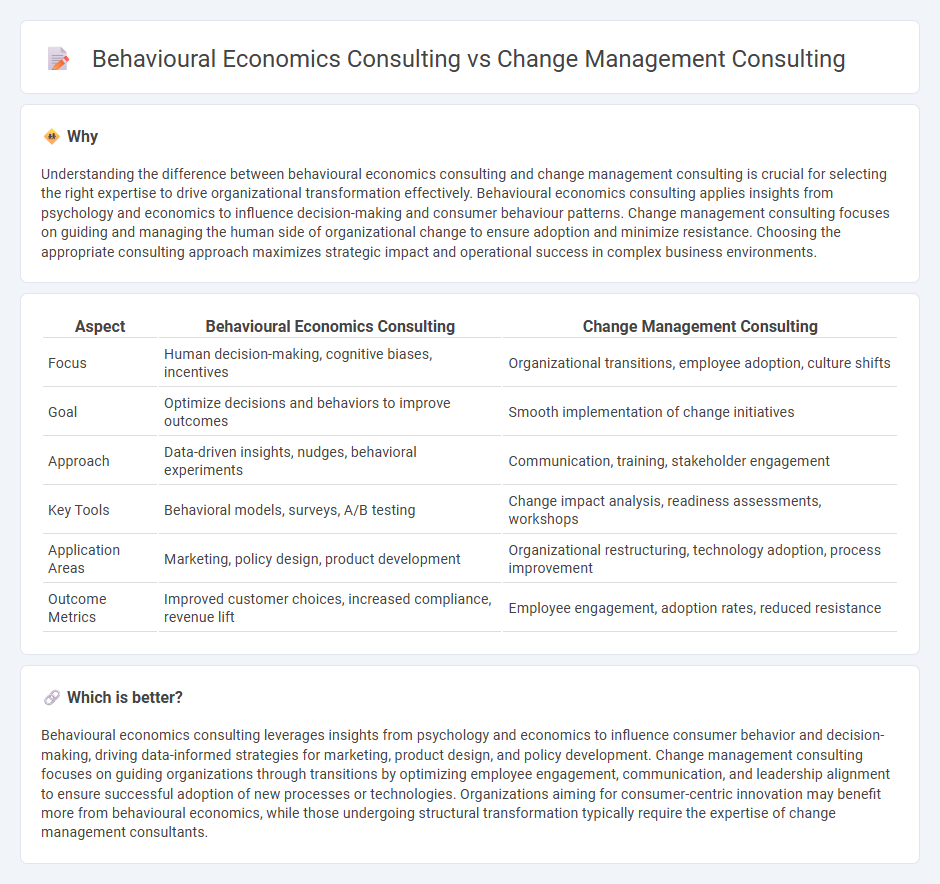
Behavioural economics consulting applies psychological insights and economic principles to influence decision-making and improve organizational outcomes, focusing on understanding and altering human behavior through data-driven analysis. Change management consulting emphasizes guiding companies through transitions by developing strategies that manage resistance, communicate effectively, and sustain long-term adoption of new processes or technologies. Explore the distinct methodologies and benefits of each consulting approach to determine the best fit for your organizational needs.
Why it is important
Understanding the difference between behavioural economics consulting and change management consulting is crucial for selecting the right expertise to drive organizational transformation effectively. Behavioural economics consulting applies insights from psychology and economics to influence decision-making and consumer behaviour patterns. Change management consulting focuses on guiding and managing the human side of organizational change to ensure adoption and minimize resistance. Choosing the appropriate consulting approach maximizes strategic impact and operational success in complex business environments.
Comparison Table
| Aspect | Behavioural Economics Consulting | Change Management Consulting |
|---|---|---|
| Focus | Human decision-making, cognitive biases, incentives | Organizational transitions, employee adoption, culture shifts |
| Goal | Optimize decisions and behaviors to improve outcomes | Smooth implementation of change initiatives |
| Approach | Data-driven insights, nudges, behavioral experiments | Communication, training, stakeholder engagement |
| Key Tools | Behavioral models, surveys, A/B testing | Change impact analysis, readiness assessments, workshops |
| Application Areas | Marketing, policy design, product development | Organizational restructuring, technology adoption, process improvement |
| Outcome Metrics | Improved customer choices, increased compliance, revenue lift | Employee engagement, adoption rates, reduced resistance |
Which is better?
Behavioural economics consulting leverages insights from psychology and economics to influence consumer behavior and decision-making, driving data-informed strategies for marketing, product design, and policy development. Change management consulting focuses on guiding organizations through transitions by optimizing employee engagement, communication, and leadership alignment to ensure successful adoption of new processes or technologies. Organizations aiming for consumer-centric innovation may benefit more from behavioural economics, while those undergoing structural transformation typically require the expertise of change management consultants.
Connection
Behavioural economics consulting and change management consulting are interconnected through their focus on understanding and influencing human behavior to drive organizational transformation. By leveraging insights into cognitive biases and decision-making processes, behavioural economics consulting enhances change management strategies to improve employee adoption and commitment. This synergy optimizes intervention designs, leading to more effective implementation of change initiatives and sustainable business outcomes.
Key Terms
**Change management consulting:**
Change management consulting focuses on guiding organizations through transitions by applying structured methodologies to manage people, processes, and technology shifts effectively. It emphasizes stakeholder engagement, communication strategies, and training programs to minimize resistance and ensure successful adoption of change initiatives. Discover how change management consulting can drive organizational agility and transformation by exploring key approaches and case studies.
Stakeholder Engagement
Change management consulting prioritizes structured communication and clear stakeholder role definition to ensure smooth transition and adoption of organizational changes. Behavioural economics consulting emphasizes understanding cognitive biases and decision-making patterns to design interventions that nudge stakeholders towards desired behaviors. Explore deeper insights on how tailored strategies in stakeholder engagement drive successful outcomes.
Organizational Culture
Change management consulting emphasizes structured approaches to transforming organizational processes and employee behaviors to align with new business strategies, often relying on frameworks like ADKAR or Kotter's 8-Step Process. Behavioural economics consulting applies insights from psychology and economics to understand and influence employee decision-making, addressing cognitive biases and heuristics that impact organizational culture. Explore how each consulting approach uniquely drives sustainable culture change by improving employee engagement and performance.
Source and External Links
Change Management Consulting & Advisory Services - Prosci provides tailored change management consulting, coaching, and advisory services to individuals, project teams, and organizations, equipping key players with the skills and strategies to build change readiness, drive adoption, and embed change competencies throughout the enterprise.
Organizational Change Management - Centric Consulting helps organizations build a strategic, people-oriented foundation for change by aligning leadership vision, fostering communication, and implementing iterative, agile approaches to minimize risk and maximize adoption during complex transformations.
 dowidth.com
dowidth.com